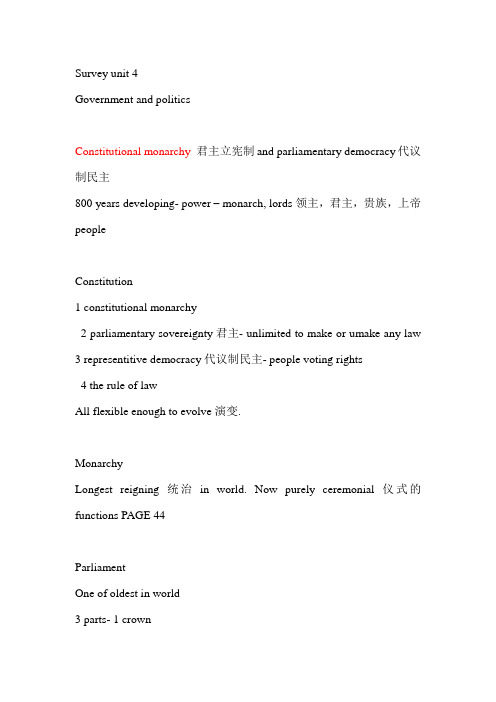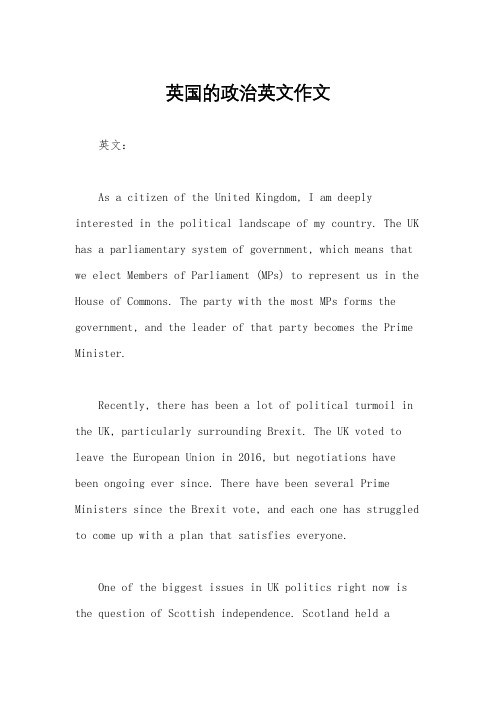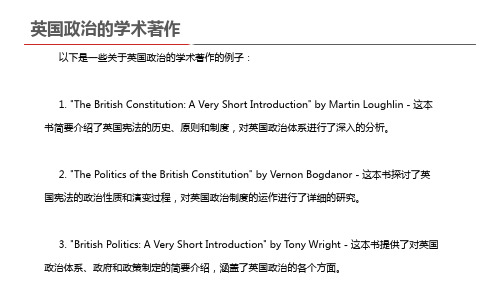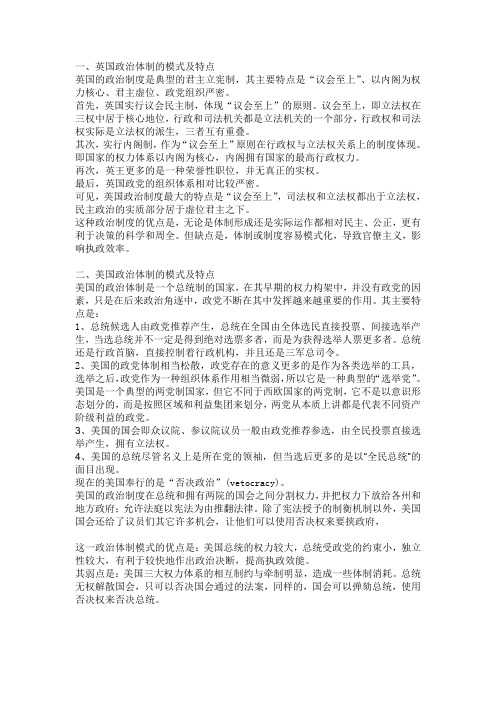英国政治4 UK politics
英国的政治制度

英国的政治制度英国也是一个移民国家,它居民来自早期欧洲大陆的迁徙。
在历史的长河中,英伦三岛大部分时间是荒芜的。
公元43年,罗马帝国将英格兰便成它的一个行省,也是发现那里有大片土地,而且也有人居住。
罗欧亚大陆是联通的,4世纪的欧洲,被一股外来势力所纠结。
他们就是被中国赶出去的匈奴,罗马帝国再衰退,匈奴人的入侵加剧了西罗马帝国的灭亡。
地处德国和丹麦的日耳曼人盎格鲁、撒克逊人继续向西飘洋渡海。
他们成为英格兰的主宰,英格兰的名称就源于这里。
1066年法国诺曼底公爵威廉率军入侵,加冕为英王威廉一世,这个“征服者威廉”,建立起的强大王权对稳固封建秩序起了积极作用。
与中国不同,古代欧洲封建国王的继承制度,是按照亲属关系亲密程度排序的,国王也受制于宗教。
13世纪,国王约翰从即位一开始就不被人们看好,人们疑心他是将侄子暗杀后,才得到王位继承权。
面对质疑,约翰与教皇就坎特伯雷大主教的任命出现争执,导致教庭向英格兰施以惩罚,约翰国王最后被迫于1213年向教皇屈服。
针对法国占领了英国在诺曼底大部份的土地,英国的贵族要求国王取回失去的领土。
约翰即在1214年发动对法国作战,却遭逢大败。
1215年,封建贵族乘机联合对国王不满的各方力量反对约翰王。
5月17日,封建贵族得到伦敦市民支持,占领了伦敦。
6月10日,英格兰的封建贵族在伦敦聚集,挟持英格兰国王约翰。
约翰被迫赞成贵族提出的“男爵法案”(Articles of the Barons)。
1215年6月15日,在强大压力下,约翰在兰尼米德〔RunnyMede〕签署《大宪章》。
其中主要反映西欧封建政治制度的特点,即国王只是贵族“同等中的第一个”,没有更多的权力。
当今世界民主制度,多少带有探险者的印迹。
作为早期开拓者的后代,不免留有他们的思想痕迹,带有功利性、现实性。
因为物质成果受人尊敬,这一思想已经领导全球200多年。
美国也是英国的延续。
《大宪章》全文共63条。
有许多内容是保障封建贵族的权益。
英国政治,经济体制

Survey unit 4Government and politicsConstitutional monarchy君主立宪制and parliamentary democracy代议制民主800 years developing- power – monarch, lords领主,君主,贵族,上帝peopleConstitution1 constitutional monarchy2 parliamentary sovereignty君主- unlimited to make or umake any law3 representitive democracy代议制民主- people voting rights4 the rule of lawAll flexible enough to evolve演变.MonarchyLongest reigning 统治in world. Now purely ceremonial仪式的functions PAGE 44ParliamentOne of oldest in world3 parts- 1 crown2 house of lords3 house of commonsJob is to create, abolish, ammend修改,修订laws, vote on taxation课税+expenditure花费, examine government policies and debate issuesMax duration持续,持续的时间,期间of a government 5 yearsHouse of commons下议院(real power) read PAGE45billsoractshavetogothroughHOC3times,ifpassthisprocessisrepeatedfortheHOL-thenbecomesalaw.houseoflords下议院notdemocraticallyelectedhencepowerreduced-morefordebateandfunctionsashighestcourtofappeal'Governmentcentral/nationalgovernmentandlocal(countyanddistrict)HMgovernment,basedatWhitehalllondon.PMisleaderofthepoliticalpartythatholdsthemostseatsintheHOC,he/sheformsacabinetofministers(20mostimportantdepartmentleaders)departmentsstaffedbycivilservants(poiticallyneutral)localgovernmentanddevolution53counties,369districts.havelocallyelectedcouncilsBUTcontrolled by laws and policies of national government1990s – policy of devolutionPolitical parties and electionsPresently 3 main parties- labour, conservative and liberal democrats BUT alsomanysmallerones.electionsUkdividedinto659constituencies,eachprovidesoneMP(whateverpartythepeoplevotefor)everyoneover18hasthevotevotingisnotcompulsorycandidates-anyoneover18-donotHAVEtojoinapartycanbeindependentcandidatewiththemostvoteselectedtoHOCtorepresenttheirparticularconstiuency5 judicaryVery old tradition of laws.Scotland wales n ireland and england= not the same BUT many laws incomonThe rule of lawRead page 53Sources of law3 main sources1 common law- developed through history by court decisions2 statute law- formal written laws pased by governments (superior to above)3 EU law- mainly economic and socail matters(sometimes superior to above)The court systemDivided into criminal and civil read page 54Criminal courtsMinor offences= local magistrates court ( magistrate is ordinary citizen advised by legal clerk)Serious offences= crown courts, judge and random juryCourt of appeals hears appeals from crown courtHouse of lords hears appeals from court of appealsCivil courtsMoney,contracts, property, family mattersMinor= county courtMajor= high courtHouse of lordsHighest court of appeal for criminal and civil courtsAppeals are about the meaning/interpretation of the law rather than evidence in a caseJudicial proceedingsRead page 57Criminal- 1 police charge 2 crown prosecution review and decide whether to proceedTrial open and public BUT media not allowed to prejudiceProsecution VS defenceAccussed has a right to employ a solicitor/barrister- if no money they are given legal aid by governmentRead page 57Civil courts- simplerLaw and orderCrime and punishmentBig problem in thenUK especially juvenile and drink/drug offences Biggest prison population in west europeDeath penalty abolished in 1965Police52 police authorities in UK, 126 000 police personsBobbies, fuzz, boys in blue, coppers, pigs,No guns。
英国政权组织形式的特点

英国政权组织形式的特点
英国政权的组织形式是一个议会制君主立宪制度。
以下是其主要特点:
1.君主立宪制度:英国的君主是国家元首,但实际上并不拥有太多实权,只是象征性的角色。
国家的实际管理和决策权在议会和政府手中。
2.议会制度:英国的议会由两个部分组成,上议院和下议院。
上议院是由贵族和教士组成的,是一个相对较为保守的机构,主要负责审查和修改议案。
下议院则是由普选产生的议员组成的,是政治权力的中心,负责制定法律和掌握政府的决策权。
3.内阁制度:英国政府的权力由内阁掌握。
内阁成员由首相任命,通常是议会中最大的政党的领袖。
内阁成员负责制定政策和管理政府事务,由议会对其工作进行监督。
4.民主选举制度:英国是一个民主国家,政府和议会成员均由选举产生。
英国的选举制度是单议席制,每个选区只产生一个议员,由获得最多选票的候选人当选。
5.法律制度:英国的法律制度以普通法为主,以英国国内的司法制度为基础。
同时,欧盟法也在英国的法律中具有一定的地位,但随着英国脱离欧盟,其地位将发生变化。
总的来说,英国政权的组织形式是一个相对稳定和成熟的议会制君主立宪制度,其政治体系在历史上经历了多次演变和改革,但在各种制度和机构的配合下,始终保持着一定的政治稳定性和权力均衡。
1。
英国政治体制

上院,又称为贵族院——它全部都是红色的长椅——多数由政府任命,并且终身任职。它的主要职责是对下院通过的立法进行表决,或者在必要时将其发回重新进行讨论。
In certain circumstances the government can force through legislation passed by the Commons but rejected by the Lords.
When does an election happen?
一场选举何时举行?
The UK has no written constitution. Instead the country's electoral system is based on a series of parliamentary acts dating back to the 17th century, when men wore the sort of tights and wigs still donned on ceremonial occasions by some officials of the Houses of Parliament.
选民不能直接选举首相或者政府首脑。而是由他们选举出候选人,这位候选人代表一个特定的党派,来担任首相职务。在议会中赢得多数议席的党的领导人会在此后由女王授权组织一届政府。在国会中第二大党的领导人成为“女王陛下的反对党领导人”。
MPs are elected by a plurality, rather than a majority, of votes. This means that a party can win a majority of seats in the Commons without achieving an overall majority in the overall popular vote. In fact, because there are three main parties in the UK it is extremely rare for a party to win an outright majority.
英国的政治英文作文

英国的政治英文作文英文:As a citizen of the United Kingdom, I am deeply interested in the political landscape of my country. The UK has a parliamentary system of government, which means that we elect Members of Parliament (MPs) to represent us in the House of Commons. The party with the most MPs forms the government, and the leader of that party becomes the Prime Minister.Recently, there has been a lot of political turmoil in the UK, particularly surrounding Brexit. The UK voted to leave the European Union in 2016, but negotiations have been ongoing ever since. There have been several Prime Ministers since the Brexit vote, and each one has struggled to come up with a plan that satisfies everyone.One of the biggest issues in UK politics right now is the question of Scottish independence. Scotland held areferendum on independence in 2014, which was narrowly defeated. However, since then, the Scottish National Party (SNP) has gained a lot of support, and there is growing pressure for another referendum. This is a complex issue, as it raises questions about national identity, economic stability, and the future of the UK as a whole.Another issue that has been in the news recently is the scandal surrounding Dominic Cummings, an advisor to the Prime Minister. Cummings was accused of breaking lockdown rules during the COVID-19 pandemic, and there were callsfor him to resign. However, he refused to do so, and the Prime Minister stood by him. This has led to accusations of cronyism and a lack of accountability in government.Overall, the political situation in the UK is complex and ever-changing. There are many different opinions and viewpoints, and it can be difficult to keep up with all the latest developments.中文:作为英国公民,我对我国的政治局势非常感兴趣。
英国政治的学术著作

以下是一些关于英国政治的学术著作的例子:
1. "The British Constitution: A Very Short Introduction" by Martin Loughlin - 这本 书简要介绍了英国宪法的历史、原则和制度,对英国政治体系进行了深入的分析。
2. "The Politics of the British Constitution" by Vernon Bogdanor - 这本书探讨了英 国宪法的政治性质和演变过程,对英国政治制度的运作进行了详细的研究。
3. "British Politics: A Very Short Introduction" by Tony Wright - 这本书提供了对英国 政治体系、政府和政策制定的简要介绍,涵盖了英国政治的各个方面。
英国政治的学术著作
4. "The Oxford Handbook of British Politics" edited by Matthew Flinders, Colin Hay, and Paul Furlong - 这本书是一部综合性的学术手册,涵盖了英国政治的各个方面,包 括政府、选举、党派、公共政策等。
5. "Political Ideologies: An Introduction" by Andrew Heywood - 这本书探讨了英国 政治中的不同意识形态和政治思潮,对英国政治的意识形态和理念进行了深入分析。
这些趣的读者都具有重要的参考价值。
《英国民主政治说课》课件

2 Labour
The Labour Party focuses on social democracy, workers' rights, and reducing inequality through government intervention.
4 Minor Parties
Various smaller parties contribute to the diversity of political representation in the UK, such as the Green Party and the Scottish National Party.
• First past the post system
• Key political parties: Conservatives, Labour, Liberal Democrats
• Postal voting and polling stations
Local Elections
Local elections determine the councils responsible for local governance and decision-making, such as education and public services.
The UK follows a system of parliamentary sovereignty, where the Parliament has the ultimate authority in making laws and decisions.
The Constitution
Unlike many other countries, the UK does not have a single written constitution, but rather relies on a combination of statutes, common law, and constitutional conventions.
英国、美国、法国政治制度比较(中英文对照版)

一、英国政治体制的模式及特点英国的政治制度是典型的君主立宪制,其主要特点是“议会至上”、以内阁为权力核心、君主虚位、政党组织严密。
首先,英国实行议会民主制,体现“议会至上”的原则。
议会至上,即立法权在三权中居于核心地位,行政和司法机关都是立法机关的一个部分,行政权和司法权实际是立法权的派生,三者互有重叠。
其次,实行内阁制,作为“议会至上”原则在行政权与立法权关系上的制度体现。
即国家的权力体系以内阁为核心,内阁拥有国家的最高行政权力。
再次,英王更多的是一种荣誉性职位,并无真正的实权。
最后,英国政党的组织体系相对比较严密。
可见,英国政治制度最大的特点是“议会至上”,司法权和立法权都出于立法权,民主政治的实质部分居于虚位君主之下。
这种政治制度的优点是,无论是体制形成还是实际运作都相对民主、公正,更有利于决策的科学和周全。
但缺点是,体制或制度容易模式化,导致官僚主义,影响执政效率。
二、美国政治体制的模式及特点美国的政治体制是一个总统制的国家,在其早期的权力构架中,并没有政党的因素,只是在后来政治角逐中,政党不断在其中发挥越来越重要的作用。
其主要特点是:1、总统候选人由政党推荐产生,总统在全国由全体选民直接投票、间接选举产生,当选总统并不一定是得到绝对选票多者,而是为获得选举人票更多者。
总统还是行政首脑,直接控制着行政机构,并且还是三军总司令。
2、美国的政党体制相当松散,政党存在的意义更多的是作为各类选举的工具,选举之后,政党作为一种组织体系作用相当微弱,所以它是一种典型的“选举党”。
美国是一个典型的两党制国家,但它不同于西欧国家的两党制,它不是以意识形态划分的,而是按照区域和利益集团来划分,两党从本质上讲都是代表不同资产阶级利益的政党。
3、美国的国会即众议院、参议院议员一般由政党推荐参选,由全民投票直接选举产生,拥有立法权。
4、美国的总统尽管名义上是所在党的领袖,但当选后更多的是以“全民总统”的面目出现。
- 1、下载文档前请自行甄别文档内容的完整性,平台不提供额外的编辑、内容补充、找答案等附加服务。
- 2、"仅部分预览"的文档,不可在线预览部分如存在完整性等问题,可反馈申请退款(可完整预览的文档不适用该条件!)。
- 3、如文档侵犯您的权益,请联系客服反馈,我们会尽快为您处理(人工客服工作时间:9:00-18:30)。
Politics
• • • •
1. General election 2. Formation of the government 3. Political parties 4. Recent political trends
1. general election
the policies of the Conservative:
• 1. privatise私有化 nationalized industry (successful, companies become efficient and profitable) • * negative consequences of the policy: • 1) Unemployment went up • 2) Poverty increased • 3) Government welfare payments have become less generous. So the society became less equal---a time of “private affluence and public squalor”一部分个人富裕起来,而大部分百姓的生 活却贫困化, 公众福利制度也处于困境)
• the Liberal Democrats(自由民主党)
• --- the 3rd biggest party and often seen as a party of the “middle”, occupying the ideological ground between the two major parties. They are comparatively flexible and pragmatic in their balance of the individual and the social. They emphasize the need to change the Britain’s constitutional arrangements to make the government more democratic and accountable.
2. the formation of the government
• 650 members of parliament are elected in the general election representing 650 constituencies in the UK. • The party which holds a majority of those “seats” in parliament forms the government, with its party leader as the Prime Minister. • A government can be in power for 5 years.
内政大臣雅克-史密斯
国防大臣- 达斯· 布郎
财政大臣阿利斯泰尔· 达林
英国外交大臣戴维.米利班德
vote of no confidence (不信任投票)
• a statement put forward by an MP — usually a member of an opposition party— for the House of Commons to vote on saying that “ This house no longer has confidence in the Government”. • If the government loses a “vote of no confidence” in the House of Commons, that is, if a majority of MPs agree, then it has effectively lost its ability to govern and is forced to resign and call a general election. • An example of this happened in 1979 with the Labour government
new Prime Minister produced
the electoral campaigns
• Before a general election, the political parties would start their electoral campaigns in order to make their ideologies and policies known to the public. • The campaign involves advertisements in newspapers, door-to-door campaigning, postal deliveries of leaflets and “party electoral broadcasts” on the televisions(政党选举电视讲话). • The parties also try to attack and criticize the opponents’ policies. Therefore, these campaigns sometime can be quite aggressive and critical.
Churchill-V-sign
To sum up:
• Conservative party---1. protect individual’s right to acquire wealth and to spend it how they choose 2. low taxation 3. supported by big companies • Labour party---the newest; one of the two biggest (the other is the Conservatives); socialist party • The Labour government (in 1945):1. set up the National Health Service 2. provide welfare payments 3. nationalized a wide range of industries 4. high taxation level 5.supported by trade unions
• the Conservative party (保守党)
• --- one of the 2 biggest parties in the UK. It is basically the party of the individual, protecting the individual’ s right to acquire wealth and to spend it as he/she wants. It advocates economic policies which are favourable to businessmen, such as low taxes. From 1979 to 1997, the Conservative party won 4 consecutive elections and was in power for quite a long period of time.
• 2. cut tax rates (a less re-distributive taxation system削弱再分配性质的税收制度)
• Summary of the political trend in the 1980s: • British politics move to the “right”, away from the “public” and toward the “private”; away from the “social”, and toward the “individual”.
• General elections are very important in the western democracy. They provide opportunities for people to influence future government policies and to replace those incompetent political leaders.
3. political parties
• the Labour party(工党) • --- one of the 2 biggest parties in the UK. It ated by the trade union movement at the end of the 19th century. It is a socialist party, believing that a society should be relatively equal in economic terms, and that the government should redistribute the wealth between the rich and the poor. It also thinks that the government should provide a range of public services for all the people.
4. recent political trends
• In 1979, the Labour government faced a vote of no confidence, which it lost, causing a general election. • This was won by the Conservative under their leader, Margaret Thatcher, who became the UK’s first woman Prime Minister.
